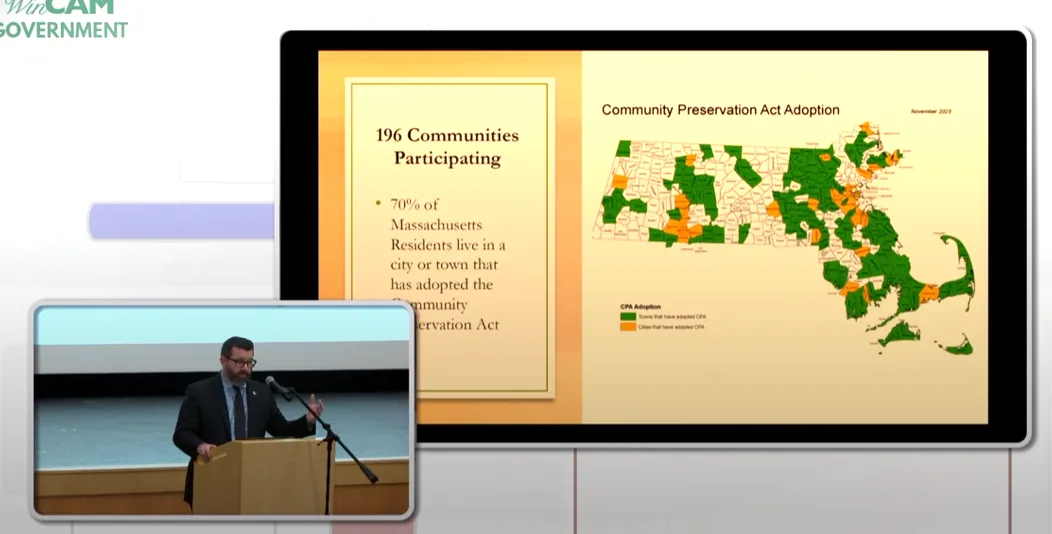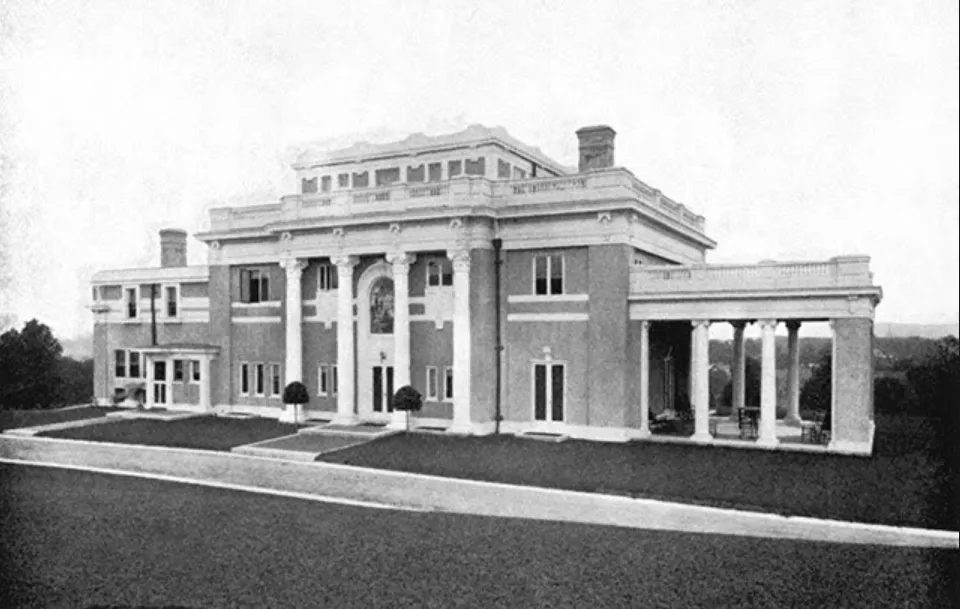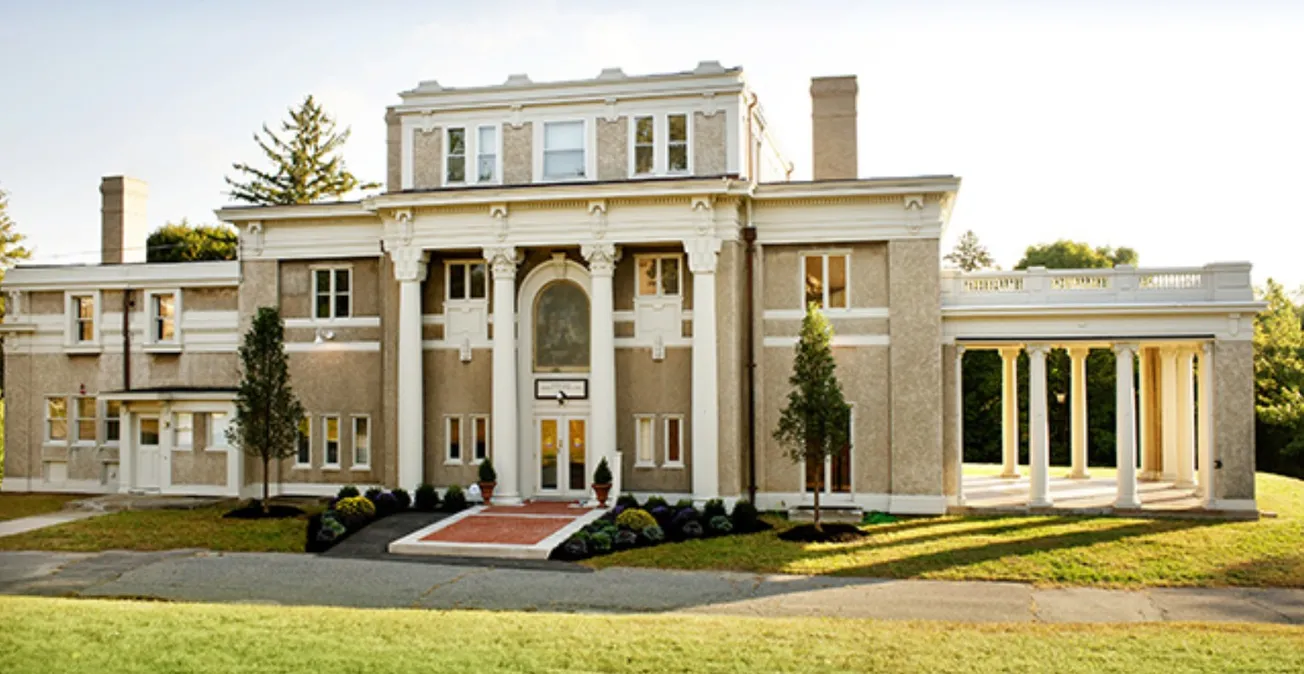Table of Contents
Spring Town Meeting is over. In the final, and longest, of the four nights, the body wrapped up the fiscal year 2025 budget, created a new bylaw and approved a new gym floor at Winchester High School.
Despite the passage of Article 9 last week in a landslide vote that put the Community Preservation Act on the November ballot for final approval, Town Meeting this week took up Article 10 in order to create a bylaw that establishes a committee to oversee projects and spending.
Select Board member Michael Bettencourt once again went over the specifics of the CPA — a state law passed in 2000 that enables Bay State communities to raise funds for open space, historic preservation, affordable housing and outdoor recreation/open space through a surcharge tax and state-matching funds.
If approved by voters at the Nov. 5 election, the projected CPA revenue to be raised at a 1.5% surcharge is $1.53 million in its first year. The estimated 20% state match is $306,259, based on the most recent match.
So far, 196 communities across the state have adopted the CPA. None have voted to repeal the measure.
Bettencourt said the motion before Town Meeting on May 9 had been amended by the Select Board after recommendations were made by various stakeholders to diversify and strengthen the makeup of what will be known as the Winchester Committee for Community Preservation (WCCP).
While several town boards and committees supported the enactment of the bylaw, others voted unfavorable action.
Roger McPeek, of the Capital Planning Committee, questioned how the WCCP would work with his committee. He said he felt Article 10 was “rushed.”
Others questioned how and who would be picked to sit on the WCCP, even suggesting an amendment that would drop the Select Board’s designee in favor of adding two Finance Committee members.
However, Town Counsel Jay Talerman told Town Meeting that FinCom members are not legally allowed to sit on any other committee, with the exception of Capital Planning.
An amendment to then add two at-large members designated by FinCom and strike a Select Board member failed with 92 in the negative, 46 in the affirmative and 5 abstentions.
Dorothy Simboli then suggested an amendment to strike language in order to clarify that Town Meeting members are allowed to sit on the WCCP. The amendment passed by majority vote.
More debate yielded questions about what would happen if Article 9 passed in November and Article 10 was postponed or failed. Talerman said it would not impact the CPA itself, just the implementation.
“The [CPA] could not be utilized because it’s a requirement to have a CPA committee,” Talerman said. “You could look at it next spring, but then you would miss out on the possibility of submitting projects next spring.”
Jimmy Johnson, who spoke as a Town Meeting member, questioned the Select Board on its method of picking a study committee without advertising the positions, interviewing candidates in public or voting on candidates.
Bettencourt defended the board by saying this was a study committee with one objective — to create a report about the CPA. The Select Board, he said, has created such committees before and as the proponent of this article, was not required by law to advertise or vote anything.
“It’s not Select Board policy and it’s not required by the charter,” Bettencourt said. “We don’t do it unless it’s a standing committee with terms to be filled.”
Johnson, however, held his ground.
“That’s not how we do things in this town,” he said, calling the process “flawed” and “not right.”
Town Moderator Heather von Mering ended any more discussion with a motion to end the debate. A final vote on Article 10, as amended, yielded 88 votes in the affirmative, 52 in the negative and 5 abstentions.
WHS gym floor project
Winchester High School is getting a new gym floor and a realignment.
Educational Facilities Planning and Building Committee Co-Chair Chris Nixon went over the plan, which would replace the current rubberized 19-year-old floor with athletic maple, replace equipment and reconfigure the alignment of the gym by 90 degrees.
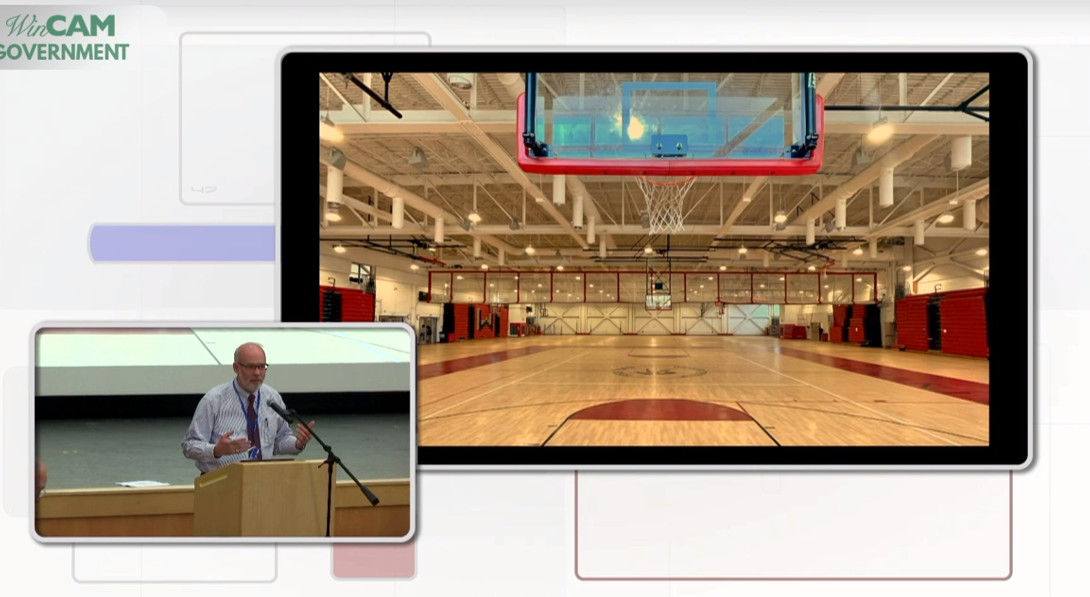
He said the gym was not among the items on the last upgrade at WHS because at the time it was only four years old.
Nixon also said current Massachusetts Interscholastic Athletic Association (MIAA) rules will disallow Winchester from hosting tournament games because the current gym only allows for 300 occupants while updated rules call for 500. Similar rules are being enacted in other sports, such as volleyball.
The project calls for $2.6 million, which includes a cushion if construction costs go up. The project could go to bid by June and be in the construction phase by August, with a December completion date.
Students from WHS were on hand to urge Town Meeting to vote for the project.
Maeve Collins, who plays volleyball and basketball, said she was in the gym every day and the floor was obviously damaged and slippery.
“I love playing in Winchester,” said Jimmy Watt, captain of the boys volleyball team. “I love seeing people I know in the crowd. It’s demoralizing to think we could only host the first round in a tournament.”
In a unanimous vote, Town Meeting members agreed with students and passed the measure. Clapping followed the vote.
Budget questions
In the closest vote of Town Meeting, members heard heated debate about whether or not to dip into the town’s Health Insurance Stabilization Fund, created in 2022.
The Select Board asked Town Meeting to vote on an amendment to reduce the fund from $250,000 to $45,000 and take an additional $205,000 from Free Cash for health insurance instead of using the entire thing.
Finance Committee Chair Dr. John Miller said FinCom had not seen the motion, but was opposed to the policy created by the Select Board in October 2023.
“You’re creating a sock with a lot of money in it,” Miller said, referring to the fund. “You put it in a closet in Town Hall and you never use it.”
Miller said FinCom was given a $1.9 million deficit to overcome in the FY25 budget and the money in the “sock” needed to be used. He said he wasn’t against the health fund, but said if the town doesn’t use the money in the fund, it will never use the money in the fund.
Rich Mucci, however, said last fall he stood before Town Meeting as a member of the Select Board to talk about putting more money into the fund. He said right now, the town has excess Free Cash and should use it instead of draining the fund.
Select Board member Bill McGonigle said the fund is earning interest and the town is most certainly going to use it in the future, especially with the cost of health insurance increasing year over year. He said the Select Board’s request was a plan for the future.
With a yes vote moving the Select Board’s suggestion to use Free Cash for the fund and a no vote sticking to FinCom’s recommendation to use the entire fund and replenish with money after the current fiscal year closes out in August, Town Meeting votes were within a razor margin.
The final vote came in with 76 votes in the affirmative, 72 in the negative and 7 abstentions.
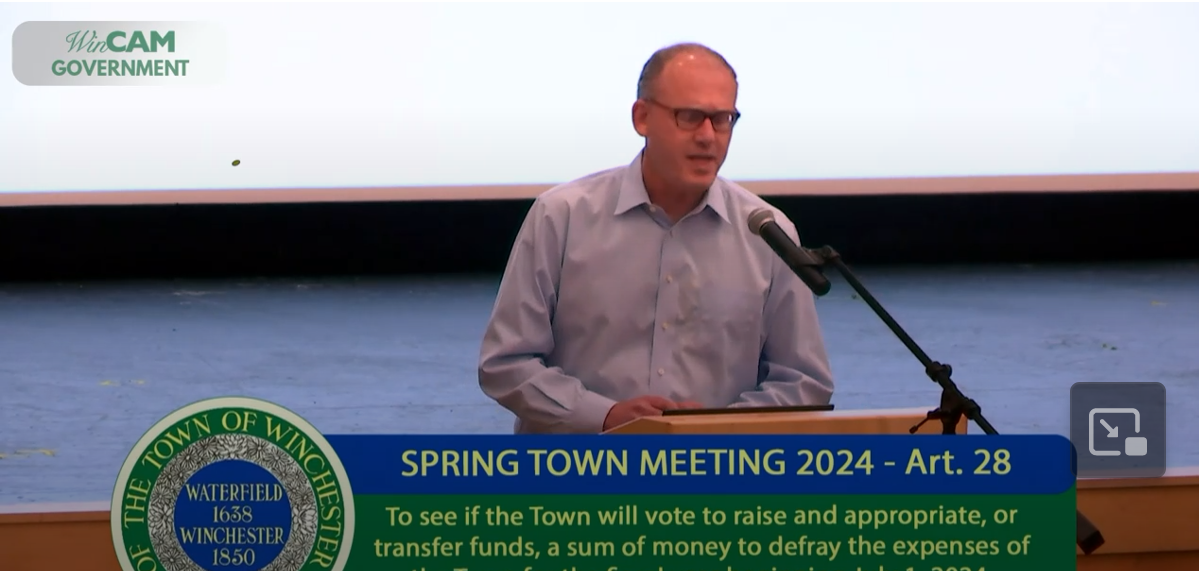
No stipends
The Retirement Board will not be seeing a $4,500 stipend in its future. Article 6 asked the town to allow the board to be paid for its efforts.
Board Chair Robert Frary said with new requirements coming up all the time, most people stay only one or two terms on the board before moving on. However, he felt with some compensation it would attract members who would stay longer and create continuity.
Frary said of the 102 retirement boards in the state, 72 are compensated. With pension reform in 2011, the state allowance for boards went up from $3,000 to $4,500.
Frary added the money for the measure would come from the pension fund itself. The only reason the board was asking the town to vote it, he said, is because by law the town has to approve the measure.
“We’re voting unfavorable on this,” said Select Board member John Fallon. “This would create a precedent for us and we’re uncomfortable that benefits are being used from the pension fund.”
FinCom also voted an unfavorable action on the motion.
Town Meeting agreed, voting down the article.
Other business
The town will be funding both the water and sewer enterprise fund as well as the Recreation Department’s budget, with the passage of Article 29 and Article 30, respectively.
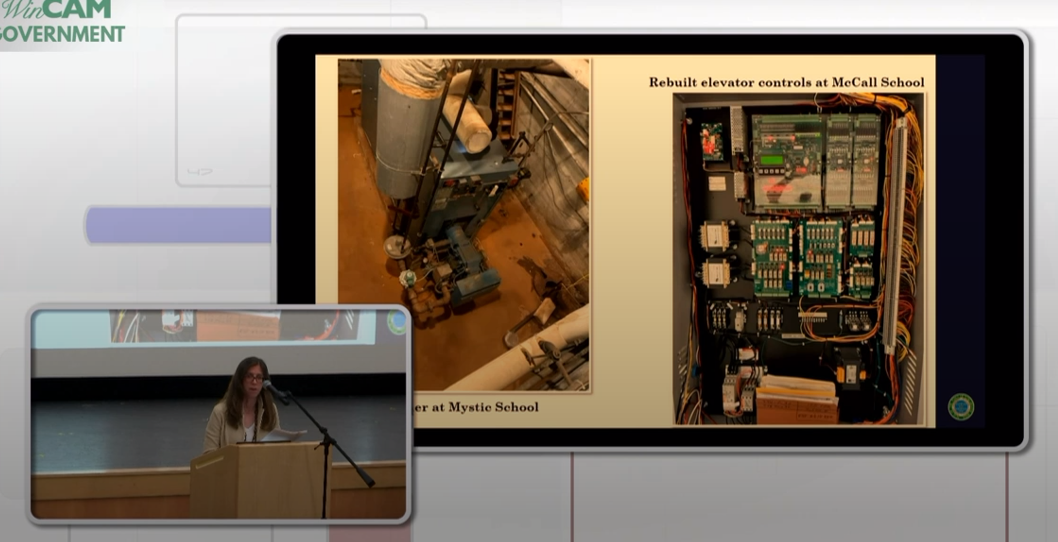
The Strategic Maintenance Fund will see an increase from $100,000 to $200,000. Town Manager Beth Rudolph said the fund is used for repairs across all municipal departments as well as school facilities.
The Personnel Board passed all four of its motions in Article 32, including the following:
• A 2.5% cost of living increase for non-union employees in FY25.
• Pay out $260,948 to various department budgets.
• Create a licensed childcare director position in the Recreation Department to be paid out of that department’s budget.
• Funding FY25 unallocated wages. In other words, once the police patrol union has settled its contracts, the town will be required to pay an estimated $130,143 in retroactive wages.
Good news
Although the town has passed its FY25 budget, it recently got good news that it would receive an additional $322,000 from the state.
Sen. Jason Lewis was on hand to update Town Meeting that both the House and Senate had agreed to raise the per pupil rate in the state budget to $104. The Senate, Lewis said, just released its proposed budget on May 7, agreeing with the House’s budget.
Winchester News is a non-profit organization supported by our community. If you appreciate having local Winchester news, please donate to support our work, and subscribe to our weekly newsletter.

